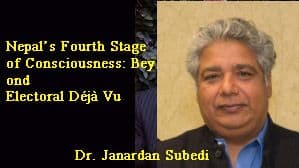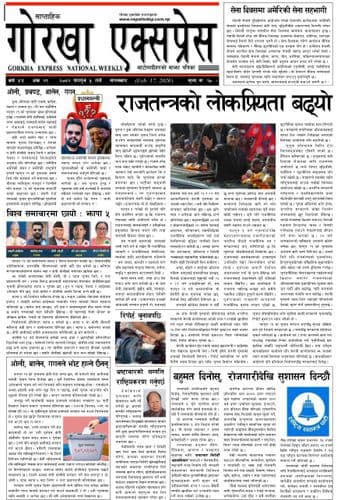
The recent bloodshed and upheaval in Nepal mark more than a governance crisis; they signal a rupture in the nation’s collective psyche. Protesters killed, trust in institutions shattered, and the state paralyzed — these tragedies raise hard questions. What course should Nepal take now? How can it shift from firefighting to nation-building?
The answers demand more than temporary fixes. Nepal must move beyond ritual elections and embrace what I call a fourth stage of national consciousness — a moral, institutional, and developmental awakening. Without it, the republic risks sliding permanently into déjà vu.
A Constitution in Crisis
Nepal’s 2015 constitution was hailed as a democratic milestone. Yet its structural weaknesses have bred instability. It makes forming a stable supermajority nearly impossible, creating fertile ground for opportunism, coalition collapse, and systemic violation of laws. Instead of curbing corruption, the constitutional framework has entrenched it.
The system does not allow decisive governance. Instead, it empowers cartels that treat ministries as bargaining chips. Accountability is sacrificed for survival. Checks and balances exist on paper, but are hollowed out in practice.
This was on full display when Gen Z protesters confronted the political cartels. Their demands for accountability were not simply about jobs or opportunities — they were about legitimacy. They revealed the hollowness of institutions and the public’s growing refusal to accept politics as usual.
A constitution that cannot guarantee stability, integrity, or accountability is not a safeguard of democracy. It is a recipe for repeated failure.
Failed Leadership, Absurd Institutions
The crisis has also exposed the shortsightedness of both the President and the Nepal Army. In moments that demanded clarity and courage, the President chose paralysis, while the Army hesitated behind narrow calculations. Together, they emboldened the cartels and magnified public despair.
The result: lives lost, public infrastructure destroyed, and faith in the state eroded.
Now, much rests on interim Prime Minister Sushila Karki. If she secures the Army’s support and asserts authority over an obstructive presidency, she may challenge entrenched cartels. If not, impunity will continue, and disillusionment will deepen. The President has already hinted he will block reforms by refusing to sign government acts — a telling reminder of where his loyalties lie.
Nepal has already paid dearly for this shortsightedness. Unless decisive leadership emerges, it will pay even more.
Nepal’s Political Déjà Vu
Nepal’s modern history can be read as three stages of political consciousness:
1. Monarchical Centralization (1960–1990): Panchayat-era absolutism suffocated citizen agency.
2. Democratic Experimentation (1990–2006): Political pluralism emerged, but weak institutions enabled corruption.
3. Republican Transition (2006–present): Formal institutions exist, but they are hollowed by capture and routinely violated.
Each stage promised renewal but delivered stagnation. Today, Nepal risks entering yet another cycle of hollow elections, empty promises, and déjà vu.
But there is an alternative: the fourth stage of consciousness, rooted in sovereignty, generational awakening, and institutional rebirth.
Toward the Fourth Stage
The fourth stage is not another political experiment. It is a conscious awakening on three fronts:
– Societal consciousness: Citizens reject corruption as normal and demand accountability.
– Institutional consciousness: Oversight bodies, courts, and commissions function with integrity.
– Developmental consciousness: Governance reforms are tied to economic planning, reducing remittance dependence and building domestic industries.
Without this triad, reforms will remain cosmetic, and democracy will continue to decline.
The Constitution Must Be Rewritten
Nepal cannot awaken while trapped in the ambiguities of its current constitution. Incremental amendments are insufficient. A full rewrite, grounded in Nepal’s history, culture, and social reality, is essential.
Equally pressing is the monarchy question. For decades it has haunted political discourse. The people must decide, through a national referendum, whether to remain a republic or restore a constitutional monarchy. Only closure will allow the nation to move forward.
A nation cannot awaken while haunted by unresolved historical questions.
Stop Blame Games, Protect Sovereignty
A striking feature of Nepal’s political discourse is the tendency to blame neighbors whenever instability deepens. India and China are alternately painted as villains depending on convenience. This rhetoric is dangerous. It weakens Nepal’s credibility, feeds public cynicism, and distracts from the failures of domestic leadership.
It is time to recognize that Nepal’s greatest threat is not its neighbors but its own corruption, disunity, and short-sightedness. India and China will always pursue their strategic interests — that is the nature of statecraft. Nepal’s survival depends on understanding friends and foes with clarity, not with slogans.
Sovereignty cannot be preserved through rhetoric or protest alone. It must be protected through strategy, resilience, and disciplined governance. Compromise here is no longer an option.
A Staged Agenda for the Interim Government
The interim government has a historic duty: to prepare Nepal not just for elections, but for transformation. That requires a staged agenda:
Stage 1: Institutional Stabilization (0–6 months)
– Halt bloodshed through non-lethal policing, suspend abusive officers, and punish violations.
– Compensate victims’ families and provide psychosocial support.
– Launch a credible independent commission to investigate the violence within 30 days.
– Empower anti-corruption institutions with impartial leadership.
– Ensure merit-based appointments and independent courts.
Stage 2: Societal Engagement (6–12 months)
– Launch civic education campaigns on integrity and accountability.
– Create platforms for youth, civil society, and experts to monitor reforms.
– Establish participatory oversight for local governance.
Stage 3: Constitutional Reform and Developmental Realignment (12–24 months)
– Draft a new constitution rooted in Nepali realities.
– Hold a national referendum on the monarchy.
– Reduce remittance dependency by incentivizing domestic industry and knowledge sectors.
– Pursue a 50-year peace and cooperation treaty with India and China — to guarantee Nepal’s sovereignty while ensuring that trade, energy, and security interests are managed constructively.
Stage 4: Election Readiness (24+ months)
– Enforce rules requiring parties to respect institutions.
– Prepare elections that legitimize governance rather than reproduce failure.
Elections without prior reform are merely ritual, not revolution.
Generational Change as Catalyst
Nepal’s youth, especially Gen Z, are central to this transformation. They are globally exposed yet locally frustrated, willing to demand meritocracy and reject patronage. Their activism is not just protest — it is the most powerful force for renewal.
This generation is unwilling to be silenced by the fear tactics that worked in the past. They organize digitally, protest creatively, and speak with clarity. For them, “normal politics” has no legitimacy.
Generational change is not a threat to stability — it is the only way to achieve it. The older generation must stand in solidarity with these youth, not dismiss them as impatient. They are the carriers of the fourth stage of consciousness.
Lessons from Abroad
Other nations show what is possible when leadership, institutions, and citizens align:
– Singapore: Lee Kuan Yew fused political will with integrity, turning a vulnerable island into a global hub.
– Botswana: Civil society ensured resource wealth fueled development rather than corruption.
– Rwanda: Post-conflict leadership matched citizen expectations with rapid recovery.
Nepal need not copy these models wholesale, but it must learn creatively. Dependency is not an option; pragmatic adaptation is.
Conclusion: From Ritual to Awakening
Nepal stands at the threshold of a new consciousness. The interim government can either repeat the mistakes of the past — ritual elections, cartels, impunity — or seize the chance to stabilize institutions, rewrite the constitution, resolve the monarchy question, and prepare citizens for meaningful elections.
This time, Nepal must also end the dangerous rhetoric of blaming neighbors while failing itself. Sovereignty requires discipline, strategy, and a long-term peace framework with India and China. Without this, instability will remain Nepal’s destiny.
Nepal’s survival as a just and steadily developing nation depends not on elections alone, but on awakening to this higher stage of national consciousness.
Author Subedi is a Professor of medical sociology at Miami University, USA
@DS


